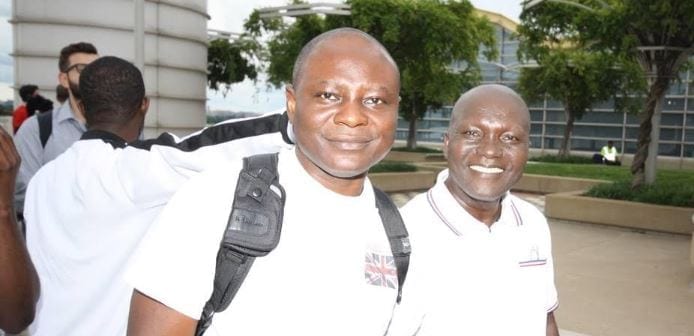After more than 10 years of partnership with agricultural workers on the Firestone Liberia rubber plantation in Harbel, the company is increasingly backtracking, including the unilateral firing of 13 percent of its workforce, says the Agriculture Agro-Processing and Industrial Workers Union of Liberia (AAIWUL). As the country’s largest employer—and therefore its employment-standards trendsetter—the union says the company’s reversal is having devastating consequences on the livelihood, rights and dignity of Liberia’s workers.
“Although we want jobs, we want good jobs,” said AAIWUL General Secretary Edwin Cisco. “Firestone Liberia is key.”
Workers’ gains on the Firestone Liberia plantation have increased in successive negotiated agreements with the company since 2008, including an end to child labor, improved pay, lower daily production quotas for rubber tappers, mechanized transportation of latex, improved housing, free education for workers’ children and access to medical clinics for workers and their families. The company’s partnership with its workers and subsequent improvements in conditions and pay have set country-wide standards for acceptable conditions of work.
“Generation after generation of workers suffered. We cannot go back,” said Cisco.
Unfortunately, since former president Ellen Johnson Sirleaf’s leadership ended in 2018, Firestone Liberia is increasingly reversing direction. The company, AAIWUL says, is reneging on its promises and undermining the union with unlawful dismissals of its leaders and large-scale layoffs of full-time union members, who are being hired back as contract workers.
“They are paid off with pain in their hearts,” said AAIWUL President Abraham Nimene.
Firestone Liberia is setting a bad example for other employers investing in the country, including multinational palm oil companies such as Golden Veroleum, which AAIWUL is organizing. Workers harvesting palm oil sought the union’s help to remedy appalling conditions—including workers’ use of dangerous chemicals without personal protection or other safety measures.
In the union’s most serious challenge, Firestone Liberia is increasingly funneling full-time union members into informal contract positions. 320 workers laid off earlier this year were rehired as contractors, joining 2,505 other contractors already working without the benefits accruing to full-time workers. Contract employees are doing the same work as full-time workers, says AAIWUL, for less pay, under worse conditions and without the wages, benefits and social protections enjoyed by full-time workers who are represented by the union. The company says that more layoffs are coming next month.
“They are going to turn the entire workforce into precarious work, and we can’t allow this to happen,” said Nimene.
By AAIWUL’s calculations, 830 jobs have been lost so far this year, after Firestone imposed transfers to contract positions, lay-offs and forced retirements. Although the company says job losses are caused by concessions it made to the country under the Sirleaf government as well as low natural rubber production and decreasing global natural rubber prices, AAIWUL criticizes the company’s lack of transparency in its financial hardship claim. Wages remain low, says AAIWUL. Although president and managing director of Firestone-Liberia, Edmundo Garcia, told the Liberia House of Representatives in 2018 that the lowest wage paid to locally hired workers is $8.36 per day, AAIWUL says that the company’s minimum daily wage for local hires is only $5.60 per day. Production on the plantation continues, said Cisco, but with increasingly exploited, precarious workers.
“We want … the basic labor rights of workers maintained,” he said.
Firestone Liberia, an indirect subsidiary of Bridgestone Americas Inc., is the largest contiguous natural-rubber producing operation in the world. The company supplies Bridgestone with raw and block latex with which to manufacture tires in the United States.
A series of agreements between workers and Firestone Liberia between 2008 through 2019 addressed conditions described in a 2006 human rights lawsuit against the company as “the modern equivalent of slavery.” After a more than one-year struggle, Firestone Liberia plantation workers signed their first agreement with the company in 2008, marking the first time the company’s workers were represented by an independent union in Firestone Liberia’s 82-year history.

